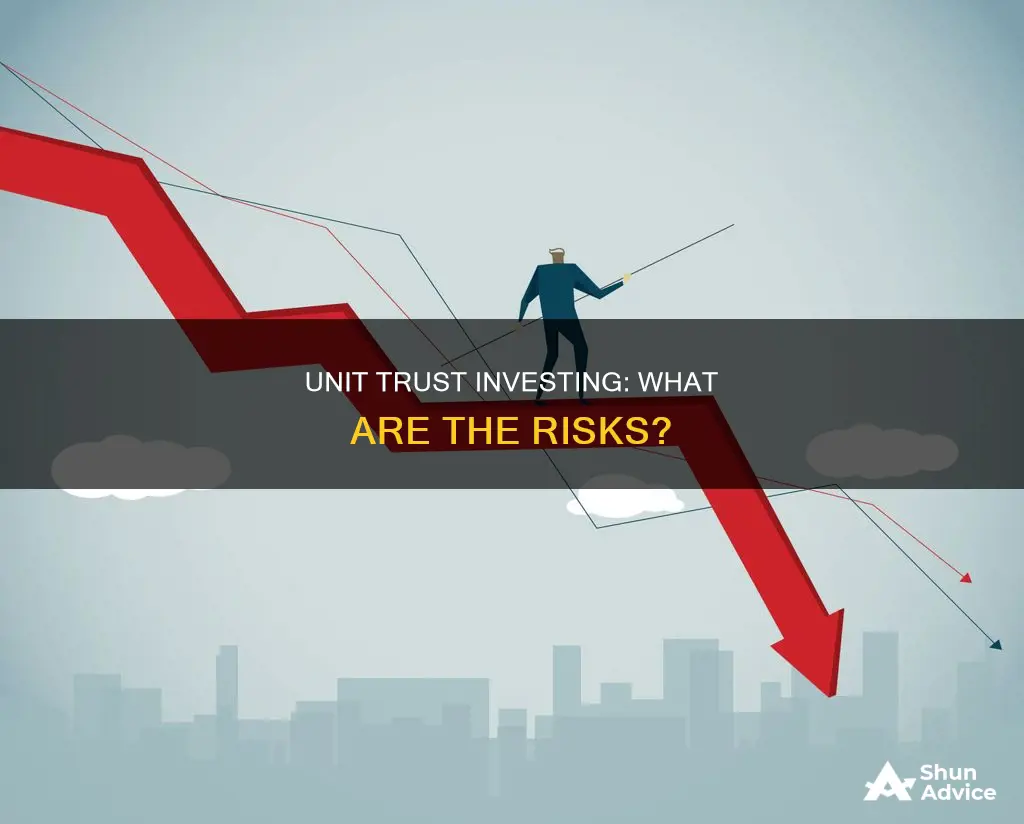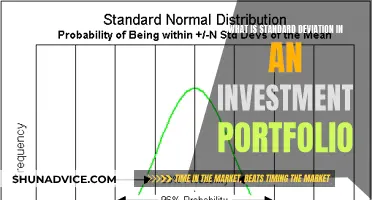
Unit trusts are a popular investment choice due to their lower fees, diversified portfolios, and professional management. However, as with any investment, there are risks involved. The value of a unit trust fund's underlying investments can change daily, affecting the value of the fund itself. This means that the value of your investment in a unit trust fund can fluctuate over time. Unit trusts are also subject to market risk, liquidity risk, inflation risk, and management risk. Additionally, if the unit trust fund invests in foreign markets or currencies, it may be exposed to country and currency risks. It is important for investors to carefully consider these risks and determine if the potential returns align with their risk tolerance and financial goals.
What You'll Learn

Unit trust funds are not a riskless investment
Firstly, the performance of unit trust funds heavily depends on the fund manager's skills and abilities. Even if a fund manager has a strong track record, it is challenging to predict whether they will consistently deliver good results. Changes in the fund management team can also impact the investment process.
Secondly, unit trust funds are subject to market risk, where a general decline in financial markets due to economic, political, or other factors can lead to a decrease in the fund's net asset value. This is particularly relevant for equity investments, as the overall market situation can influence the value of the unit trust holdings.
Thirdly, country and currency risks come into play when investing in foreign markets. Adverse changes in a country's political, regulatory, or economic landscape can negatively affect the value of investments. Additionally, fluctuations in foreign currency exchange rates can reduce the asset value of foreign investments.
Furthermore, unit trust funds are exposed to liquidity risks. If the fund holds illiquid assets or assets that are difficult to dispose of, it may be forced to sell them at unfavourable prices, negatively impacting the fund's value.
Lastly, investing in unit trust funds using loan financing increases the possibility of both gains and losses. The returns of unit trust funds are not guaranteed, and there may be times when the value of your holdings falls below a certain level, requiring additional collateral or a reduction in the loan amount.
It is important to carefully consider these risks and assess your risk tolerance before investing in unit trust funds.
529 Plans: Exploring Investment Portfolios for Education Savings
You may want to see also

Fund manager performance risk
Unit trust funds are professionally managed by fund managers, and therefore the performance of the funds is highly dependent on the managers' styles and abilities. Fund manager performance risk is one of the key risks of investing in unit trusts. While good managers are those who can produce consistent good results through good or bad times, it is difficult to determine whether a fund manager will be able to deliver good results, even when referring to their track record as guidance.
For example, if a key member of the fund management team decides to leave during the investment period, it may adversely impact the investment process. This is because unit trust funds are professionally managed by fund managers, and the performance of the funds is highly dependent on the managers' styles and abilities.
The performance of the trust relies on the fund manager. The fund manager may invest in bonds or shares on the stock market, and the fund is divided into units that investors purchase. The fund manager directs the investments of a unit trust, and investors are beneficiaries of the trust. Fund managers are paid a management fee from the fund, typically based on a percentage of the assets they manage.
The fund manager decides the fund's investment strategy and what assets to buy or sell. It is important to ensure that the fund manager's investment style is in line with your own investment objectives. You should be satisfied that the fund manager has the necessary resources, experience and skills to manage your investment. Check their track record, but note that past performance is not necessarily an indication of future performance.
Investing: Is It Worth Paying 900 Every Quarter?
You may want to see also

Loan-financing risk
Should investors fail to make the necessary top-up, the units may be sold at a lower net asset value per unit than the original purchase price to settle the loan. This can result in a loss for the investor, as the sale proceeds may not be sufficient to cover the outstanding loan amount. Therefore, it is essential for investors to carefully consider their financial situation and ability to service loan repayments before opting for loan financing to invest in unit trust funds.
The unpredictable returns of unit trust funds further compound the loan-financing risk. Since the returns are not guaranteed, investors cannot rely solely on the fund's returns to repay the loan. There may be instances when the value of the unit trust holdings falls below a certain level, requiring investors to either top up their collateral or reduce their loan amount. This uncertainty adds to the financial burden and stress of the investor.
Moreover, interest rate fluctuations can significantly impact the cost of loan repayment. When interest rates are on an upward trend, the cost of repaying the loan will also increase. This can further strain the investor's financial situation, making it even more challenging to service the loan. As a result, investors should carefully weigh the pros and cons of financing their unit trust fund investment with borrowed money.
To mitigate loan-financing risk, investors should ensure they have a thorough understanding of the potential risks involved and assess whether the investment aligns with their risk profile. It is generally recommended to avoid loan financing for unit trust fund investments, as these funds typically allow investors to start with a small amount of money and gradually grow their investment over time.
Invest Wisely, Earn 6K Monthly: Strategies for Success
You may want to see also

Country and currency risks
Country Risks
Country risks refer to the potential adverse impacts on the value of your unit trust investments due to changes in the country's political, regulatory, or economic landscape. For example, if the unit trust fund invests in a country experiencing deteriorating economic conditions, it can negatively affect the value of those investments. Political instability or changes in government policies can also impact the investment's worth. These risks are inherent in any investment with exposure to foreign markets, and it's essential to recognise that they can influence the net asset value (NAV) of the unit trust fund.
Currency Risks
Currency risks, or foreign exchange risks, arise from fluctuations in currency exchange rates. If your unit trust investments are denominated in a foreign currency, a weakening of that currency relative to your home currency can reduce the value of your investment. Conversely, a strengthening of the foreign currency can lead to gains. Currency risks are inherent when investing in foreign markets and can significantly impact the overall returns of your unit trust investment.
Managing Country and Currency Risks
To mitigate country and currency risks, diversification is a crucial strategy. By investing in multiple foreign currencies or different country markets, you can potentially offset losses in one currency or market with gains in another. Additionally, thorough research and due diligence are essential before investing. Understanding the political, economic, and regulatory environment of the countries where the unit trust fund invests can help you make more informed decisions. Regularly monitoring your investments and staying updated with global market trends can also help you navigate country and currency risks more effectively.
In conclusion, while country and currency risks are inherent in unit trust investments with foreign exposure, they can be managed through careful diversification, diligent research, and proactive investment monitoring. It's important to remember that all investments carry some level of risk, and understanding these risks is crucial before making any investment decisions.
529 Savings Plans: Smart Investment Strategies, per Forbes
You may want to see also

Equity investment risks
Unit trust funds are known for their lower risks due to their widely diversified portfolio holdings. However, they are not risk-free investments. When unit trust funds are invested in equities, the overall market situation can cause many internal or external factors that will impact the value of the unit trust holdings.
Firstly, the value of equities and equity-related securities can fluctuate daily due to stock market movements. Investors in unit trusts do not own a direct share in any of the companies the fund has invested in, but the value of their investment is still influenced by how those companies perform. Even the most diversified equity holdings are not free from market risk. The recent eurozone debt crisis, for example, impacted the entire global economy, including local markets.
Secondly, there are company-specific risks. These could arise from changes in the management team, the company losing its competitive edge, or any other factors causing the company to miss its financial targets. Thirdly, there are sector-specific risks, which could arise from changes in certain economic conditions that affect an entire sector. These types of risks are more obvious in smaller-sized funds or sector-specific funds.
Additionally, unit trust funds are considered a medium to long-term investment. The returns are not guaranteed and can vary, so investors cannot rely solely on them to repay any loans taken out to finance their investment. There is a possibility that the value of unit trust holdings may fall below a certain level, requiring investors to top up their collateral or reduce their loan amount.
Lastly, if the unit trust investments are in foreign markets and denominated in foreign currency, there is a risk of adverse changes in the country's political, regulatory, or economic situation, which can negatively impact the value of investments. Any fluctuation or weakening of the foreign currency will also reduce the asset value of the foreign investments.
Savings and Investments: Smart Money Strategies for Beginners
You may want to see also







